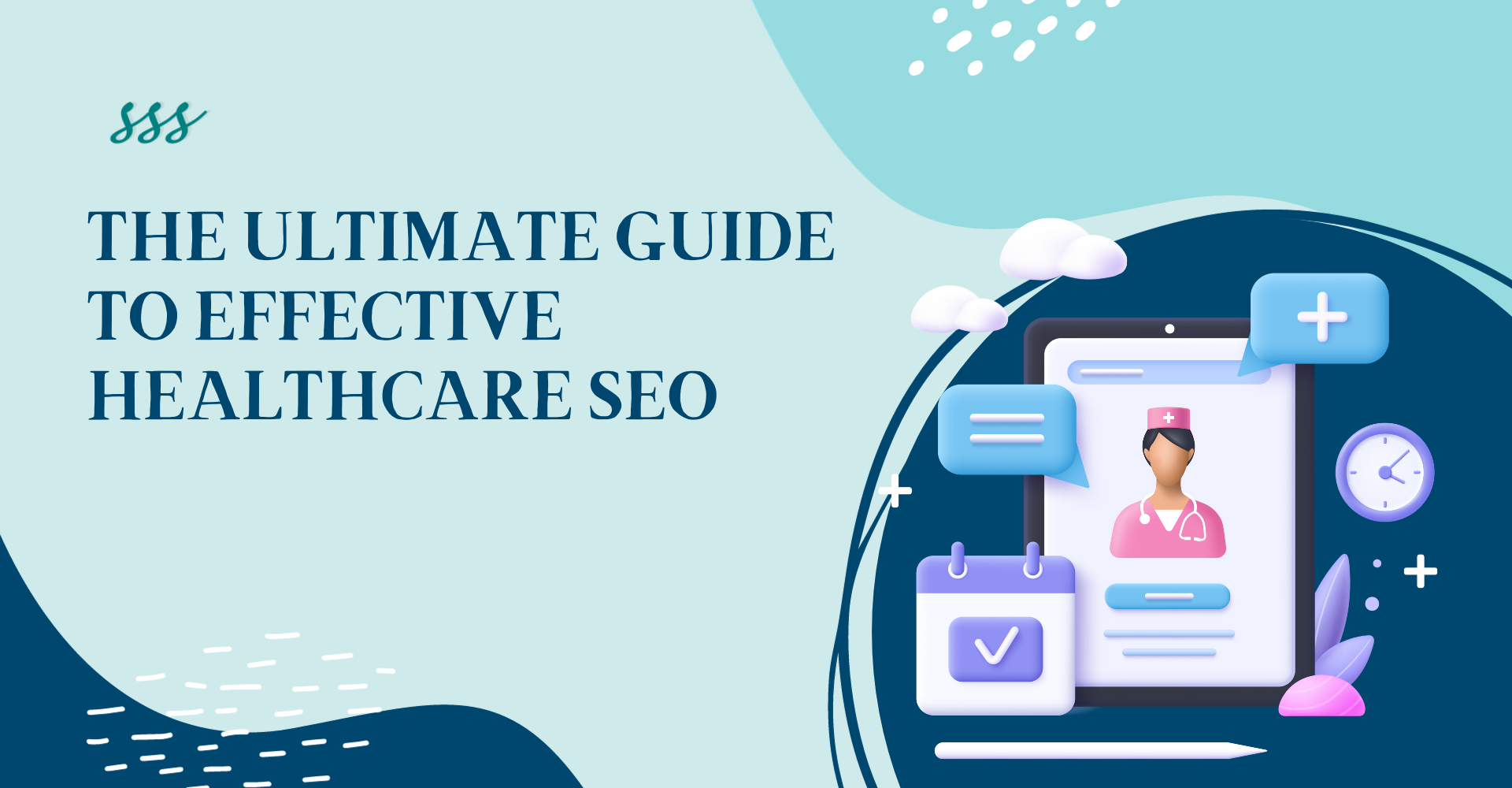
The Ultimate Guide to Effective Healthcare SEO
According to a report by Google, 77% of patients use search engines before booking an appointment with a healthcare provider. This means that if your website is not visible or relevant on search engines, you are missing out on a huge opportunity to reach and convert your target audience. Healthcare SEO plays a vital role.
However, healthcare SEO is not easy. It requires a lot of research, planning, execution, and monitoring. It also requires a deep understanding of the healthcare industry, its regulations, its customers, and its competitors. Moreover, healthcare SEO is constantly evolving, as search engines update their algorithms and user behavior changes.
There is one difference between healthcare SEO and website SEO, here you need to deal with YMYL rules, refer to Your Money or Your Life. Here we are going to discuss Healthcare SEO and the top 8 Tips for Healthcare SEO.
What is Healthcare SEO?
Healthcare SEO refers to a process of optimizing your health and medical website to gain more online visibility which helps to get attention from visitors. If users visit your website it will help to gain more traffic which will turn into sales. A perfect Medical and Healthcare SEO strategy gets the opportunity to rank its website at the top of search engines.
Every business gets benefits from its own SEO strategy. But the path for gaining more traffic is different from each other. Healthcare SEO strategy mainly works for online healthcare services like products, consultants, doctor’s appointments, advice from doctors, and more which are provided by various websites. Healthcare SEO is not for home doctors because it covers all business-to-business (B2B) and Business-to-customer (B2C) audiences.
Importance of Healthcare SEO
Healthcare SEO can help a website or landing page rank higher on search engine results pages (SERPs), which can increase the chances of being seen and clicked by users. According to a report by Google, 77% of patients use search engines before booking an appointment with a healthcare provider. This means that if a website or landing page is not visible or relevant on search engines, it is missing out on a huge opportunity to reach and convert its target audience.
Healthcare SEO can help a website or landing page provide high-quality, informative, and engaging content that answers the user’s questions and provides value to them. Content creation helps to establish authority, trust, and credibility in the healthcare industry, as well as to generate more traffic and conversions. According to a report by Forbes, 71% of respondents look to online reviews first before they choose a doctor, and 43% of respondents would choose an out-of-network provider if they had better reviews than an in-network provider. This means that having positive online reviews and testimonials can help a website or landing page build its brand reputation and loyalty among users.
Healthcare SEO can help a website or landing page improve the user experience and satisfaction, as well as ensure the accessibility and crawlability of a website or landing page by search engines. Technical SEO helps to optimize the technical aspects of a website or landing page, such as speed, mobile-friendliness, security, navigation, etc. Local SEO helps to optimize a website or landing page for a specific geographic location, such as a city, state, or country. These factors can help a website or landing page attract and retain local customers who are searching for nearby healthcare providers or services.
A strong healthcare SEO strategy can attract more visitors which helps your website get more traffic and generate more leads. Users get their key answers when they search for any health-related issues on search engines which help build trust and relationships with the website that they like to click on. Healthcare SEO helps to stand out from other competitors without paying for paid ads.
Top 10 Tips for Effective Healthcare SEO
Here are the top 10 tips for Effective healthcare SEO which are mentioned below:
- Give More Attention to Google My Business and Social Media Accounts For Online Reviews
- Create High-Quality Content on Related Keywords
- Optimize HTML Tags on Your Site
- Add Links
- Create a Listing for Local SEO
- Improve User Experience
- Focus on EAT
- Track down Your Website Performance
- Understand Language Limitations Specific to Healthcare and Pharma Fields
- Adhere to Google’s YMYL (Your Money or Your Life) Rules
1. Give More Attention to Google My Business and Social Media Accounts For Online Reviews
Reviews can be used as proof to search engines and users that they can trust your website. We see that every website has such an amount of reviews on Google My Business. To encourage your potential customers, you can send follow-up emails, reply to honest reviews, and provide exciting offers. If you give attention to reviews that might create great impacts on better customer engagement.
2. Create High-Quality Content on Related Keywords
To get organic traffic, you need high-quality content on related keywords. So, creating content will be a necessity for every website that wants to rank on search engines and maintain its online presence. For that, first, you need your target keywords for writing content and promoting your brands through it. You need to rank your website on such target keywords that people search most on search engines.
If you want to measure SEO success on whether your website ranks or not, you can check on search engines how many articles or blogs are ranking on related keywords and how much traffic you get from those keywords. For researching keywords, you can go for keywords everywhere, Google ads, Ahrefs, and more. Apart from that, you check your competitor’s website and which keywords they use for ranking their website.
3. Optimize HTML Tags on Your Site
To give your website a visual structure, HTML Tags are the most important element to use. It helps to understand your content better and makes it easy to read it. For example, if you use HTML tags such as H1 and H2 for categorizing your content in such a way as to understand which you use as titles and which lines you use for subheadings.
When you work on SEO, the H1 HTML tag also goes for Title and you can use H2 for subheadings. The best way to work on SEO is by using CMS platforms like WordPress where you get options for adding tags. Just keep in mind that the main keyword is always going to be used in the Title and meta description. If you need any help to improve your SEO performance, look into the SEO checklist.
4. Add Links
Add internal links and backlinks to bring more traffic to your website. If you add links to high-ranked pages to your website’s content, it might help to get noticed by more users and it also helps you with your page’s SEO. If you add links to your website’s related content on another content then it refers to internal linking. But it doesn’t mean you can add links on every single page of your website. You need to have an idea of where you need to put the link which should be related to each other.
5. Create a Listing for Local SEO
Local SEO helps to optimize your website for ranking on search engines in a particular area. If you have a physical location-based business then Local SEO is the main factor for ranking. Keep your information up-to-date with tools like listing management for local SEO by adding your address, phone number, and email address.
6. Improve User Experience
Patient experience or user experience (UX) can determine whether or not they book an appointment on your site or go to your competitor. With your site architecture, you can encourage a positive response. If you do not structure your website, users might get lost to find you. A perfectly structured site gives your website more accessibility which helps users to easily click on it and use it wherever they need. To improve user experience you can build a healthcare mobile app to engage with your target audience with your company.
7. Focus on EAT
This tip is about building your online reputation and credibility, which are important factors for ranking on search engines, especially for healthcare websites that fall under the category of YMYL (Your Money or Your Life) pages. EAT stands for Expertise, Authoritativeness, and Trustworthiness, which are the criteria that Google uses to evaluate the quality and reliability of a website or landing page. You can improve your EAT by providing accurate, relevant, and updated information, displaying your credentials and qualifications, getting positive reviews and testimonials from your patients or clients, and earning links from authoritative and reputable sources.
8. Track down Your Website Performance
Publishing SEO-based content is not the end of ranking your website. You need to check on search engines to see whether your website is ranking or not. You need to optimize your website regularly to get a better position on search engines. To track down your website performance, you use Google Analytics which gives you insight into your website performance.
9. Understand Language Limitations Specific to Healthcare and Pharma Fields
This tip is about avoiding jargon, acronyms, and technical terms that may confuse or alienate your audience, as well as complying with the regulations and guidelines that govern the healthcare and pharma industries. You should use clear, simple, and consistent language that can communicate your message effectively and empathetically to your audience. You should also be aware of the legal and ethical implications of using certain words or phrases that may be misleading, inaccurate, or inappropriate for your audience.
10. Adhere to Google’s YMYL (Your Money or Your Life) Rules
This tip is about complying with Google’s quality guidelines for YMYL pages, which are pages that have a potential impact on the user’s health, happiness, safety, or financial stability. Healthcare websites are considered YMYL pages by Google, which means that they are held to a higher standard of quality and accuracy than other types of websites. You should adhere to Google’s YMYL rules by providing high-quality content that is relevant, useful, factual, and updated. You should also avoid any content that is misleading, deceptive, harmful, or low-quality. You should also demonstrate your EAT (Expertise, Authoritativeness, and Trustworthiness) by providing your credentials, qualifications, contact information, etc.
Conclusion:
It takes time and effort to rank your website at the top of search engines. SEO helps you to deal with your ranking. With a full proper healthcare SEO strategy, it takes 6 to 12 months to rank your website. If you are having issues with ranking your website, you can contact us. We are always here to help you. We hope this article helps you to understand healthcare SEO. However, if you need any help to rank your healthcare website, you can contact us, a leading digital marketing company. If you want to read more on trending topics, keep your eye on our blog page.


